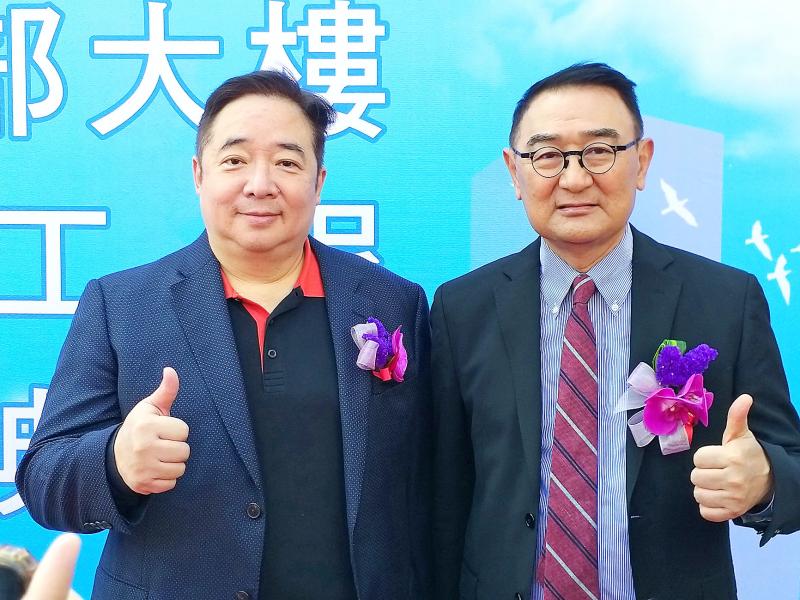MaxLinear Inc, a maker of chips for broadband communications, has agreed to acquire Silicon Motion Technology Corp (慧榮科技) in a cash-and-stock deal valuing the Taiwanese semiconductor firm at US$3.8 billion.
California-based MaxLinear is offering the equivalent of US$114.34 for each of Silicon Motion’s US depositary receipts, the companies said in a statement on Thursday.
The proposal includes US$93.54 in cash and 0.388 MaxLinear shares.

Photo: Liao Hsueh-ju, Taipei Times
The bid represents a 48 percent premium to Silicon Motion’s closing price on April 22, the last trading day before the company was first reported to be exploring a sale. The deal creates a company valued at about US$8 billion including debt, the statement said.
MaxLinear shareholders are to own about 86 percent of the combined company, it said.
Silicon Motion’s US depositary receipts jumped about 30 percent in pre-market trading on Thursday in New York. They were up 17 percent to US$94.83 at 2:24pm in New York trading, giving the company a market value of about US$3.3 billion.
MaxLinear’s shares were down 22 percent to US$41.61, their biggest drop since March 2020. The plunge was part of a larger market decline in which the NASDAQ fell 5 percent.
Silicon Motion makes NAND flash controllers for solid-state storage devices. It also supplies data center drives, and specialized drives for industry and vehicles. The company had also attracted interest from Taiwan-based MediaTek Inc (聯發科), people with knowledge of the matter said.
The acquisition is the largest to date for MaxLinear, Bloomberg data showed.
The deal is expected to close by the first half of next year, subject to regulatory clearance and the approval of Silicon Motion shareholders.
The transaction would generate annual run-rate synergies of about US$100 million within 18 months after closing, and provide an immediate material boost to MaxLinear’s earnings per share and cash flow, the statement said.
Bank of Montreal was the exclusive financial adviser to MaxLinear, while Wells Fargo & Co is providing committed debt financing. Goldman Sachs Group Inc acted as an exclusive financial adviser to Silicon Motion.

Shares in Taiwan closed at a new high yesterday, the first trading day of the new year, as contract chipmaker Taiwan Semiconductor Manufacturing Co (TSMC, 台積電) continued to break records amid an artificial intelligence (AI) boom, dealers said. The TAIEX closed up 386.21 points, or 1.33 percent, at 29,349.81, with turnover totaling NT$648.844 billion (US$20.65 billion). “Judging from a stronger Taiwan dollar against the US dollar, I think foreign institutional investors returned from the holidays and brought funds into the local market,” Concord Securities Co (康和證券) analyst Kerry Huang (黃志祺) said. “Foreign investors just rebuilt their positions with TSMC as their top target,

REVENUE PERFORMANCE: Cloud and network products, and electronic components saw strong increases, while smart consumer electronics and computing products fell Hon Hai Precision Industry Co (鴻海精密) yesterday posted 26.51 percent quarterly growth in revenue for last quarter to NT$2.6 trillion (US$82.44 billion), the strongest on record for the period and above expectations, but the company forecast a slight revenue dip this quarter due to seasonal factors. On an annual basis, revenue last quarter grew 22.07 percent, the company said. Analysts on average estimated about NT$2.4 trillion increase. Hon Hai, which assembles servers for Nvidia Corp and iPhones for Apple Inc, is expanding its capacity in the US, adding artificial intelligence (AI) server production in Wisconsin and Texas, where it operates established campuses. This

H200 CHIPS: A source said that Nvidia has asked the Taiwanese company to begin production of additional chips and work is expected to start in the second quarter Nvidia Corp is scrambling to meet demand for its H200 artificial intelligence (AI) chips from Chinese technology companies and has approached contract manufacturer Taiwan Semiconductor Manufacturing Co (TSMC, 台積電) to ramp up production, sources said. Chinese technology companies have placed orders for more than 2 million H200 chips for this year, while Nvidia holds just 700,000 units in stock, two of the people said. The exact additional volume Nvidia intends to order from TSMC remains unclear, they said. A third source said that Nvidia has asked TSMC to begin production of the additional chips and work is expected to start in the second

US President Donald Trump on Friday blocked US photonics firm HieFo Corp’s US$3 million acquisition of assets in New Jersey-based aerospace and defense specialist Emcore Corp, citing national security and China-related concerns. In an order released by the White House, Trump said HieFo was “controlled by a citizen of the People’s Republic of China” and that its 2024 acquisition of Emcore’s businesses led the US president to believe that it might “take action that threatens to impair the national security of the United States.” The order did not name the person or detail Trump’s concerns. “The Transaction is hereby prohibited,”